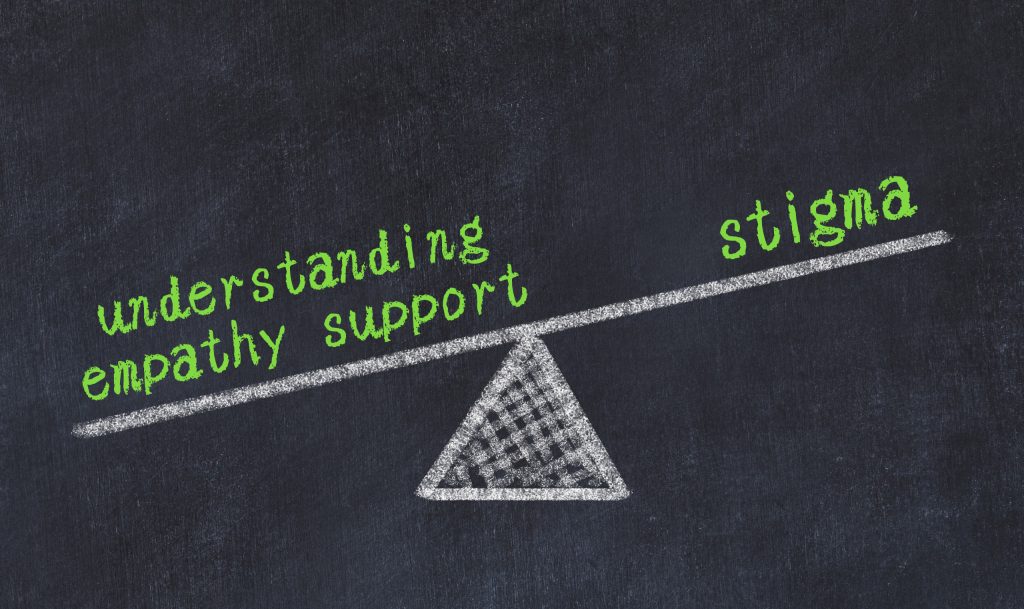I Am an Eating Disorder Therapist Who Recovered from My Own Past Eating Disorder

This is the first in a series of blogs examining the stigma surrounding mental health clinicians who live with the same conditions they treat. A variety of viewpoints and experiences will be presented. There is certainly stigma that therapists who are public about their mental health histories often face. Unfortunately, mental health stigma in general […]
Eliminate Stigma, by eliminating stigma

Have you ever wondered about the power of a single word? How does that word shape our collective journey towards recovery and wellness? This reflection takes us deep into the world of stigma within the realm of mental health and substance use, uncovering how it acts as both a barrier and a catalyst for change. […]
Suicide: The Ripple Effect as a Prime Example of Stigma Resistance

In previous posts, we discussed stigma change processes and the use of TLC4 as a planning model for framing stigma change efforts. In both of those posts, we explored the effectiveness of contact-based strategies for decreasing stigma and offering realistic hope to those facing similar challenges. The success of contact-based strategies exemplifies that stories are […]
An Introduction to Honest, Open, Proud

In February, we discussed the TLC4 Model, which explains how WISE reaches various populations and produces tangible change throughout Wisconsin. Click here to reread that article. In that post, we also said that the best way to reduce stigma is to share our own mental health challenges and story of recovery with others. However, WISE […]
Challenging Victim-Blaming

In July, we learned about “public stigma” – the stigma that people express towards others. Click here to read that article. In this post, we will examine one type of public stigma that can have a devastating psychological impact on people who are recovering from abuse. Victim-blaming is the tendency to view victims as responsible […]
The TLC4 Model

In December, we discussed several stigma change processes, including protest, education, and contact. Of these, contact with those with lived mental health experience is the most effective. Hearing about the mental health challenges and the recovery efforts of others is the best way to decrease stigma and offer realistic hope to those facing similar challenges. […]
Logic’s 1-800-273-8255 Making News & Breaking Records

Becase of their unique, stylistic elements, rappers pride themselves on their narratives, which often address current issues and/or popular trends. However, topics related to mental health have been noticeably absent from the rap genre. That is… until last April when the rapper, singer, and songwriter known as Logic released 1-800-273-8255, a song named after the […]
6 Tips for Setting Compassionate Boundaries

In September’s post, we discussed compassion resilience, or CR, and how to move from compassion fatigue toward wellness. We also discussed the 7 C’s of CR that we can apply in our work with others to ourselves. Review them here. So far, we’ve talked a lot about what CR is and why it’s so important […]
Compassion Resilience: A Path to Wellness

In August’s post, we “pounced” on the subject of compassion fatigue and its harmful path by illustrating Eric Gentry’s research with the help of some cats. Need a reminder? Review it here. Compassion fatigue can result in feelings of depression, anxiety, sadness, exhaustion, and irritation. Knowing what compassion fatigue looks like is key in understanding […]
Opiates/Opioids and Heroin in the U.S. and Wisconsin

We all know about the usage of certain substances like tobacco and alcohol. Knowing the risks, you’ve probably even used them yourself, as both are legal and/or socially acceptable. However, illicit drug use is a different issue and often flies under the public’s radar. This is especially true with a substance that’s gaining popularity in […]
